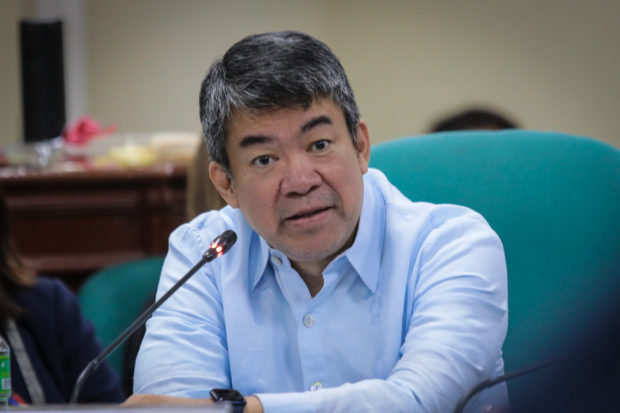
Senate Minority Leader Aquilino “Koko” Pimentel III (File photo Senate Pubic Relations and Information Bureau)
MANILA, Philippines — Proponents of the Maharlika Investment Fund (MIF) received a slew of harsh remarks from senators for their inability to respond to the lawmakers’ doubts about its organizational structure, fund sources, and the safeguards against possible fraud.
Senate Minority Leader Aquilino Pimentel III castigated the country’s economic managers for submitting to Congress a proposal that has not been well thought out, with the low quality of their output being exposed during the hearings, which the lawmaker described as the “most expensive public brainstorming sessions.”
“Being an administration measure, the Senate should not allow this [MIF bill] to pass in its current form. It is so disappointing because, for an administration measure, it should have been backed up by the best lawyers and bill drafters of the administration; yet this is the result,” he said.
Distribution of profits
Pimentel raised the issue as the Senate committee on banks, financial institutions and currencies held its second hearing on the MIF, with proponents at various stages showing discomfort in answering senators’ questions.
“We hear in the news about the president saying that the Japanese are excited to invest in the MIF. But where is the mechanism in the current bill on (how foreigners) can invest? What is the mechanism for the distribution of profits to a participating third-party investor?” he asked.
Taking up senators’ time
Pimentel lamented that the MIF has been taking up so much of the senators’ time and resources, which, he said, could have been better used to study other essential measures, such as the proposed ratification of the Philippines’ participation in the Regional Comprehensive Economic Partnership (RCEP) agreement or the bills on cultural mapping and the country’s academic recovery.
“You want to make it appear to Japanese investors that you’re very strict, but the proposed bill includes a provision that says ‘…and all other investments as may be decided by the board. Whom are you trying to fool here?” he said.
Proponents could not even agree on how much return on investments (ROI) the state-owned Land Bank of the Philippines could expect, Pimentel noted.
Not fit for approval
“I see the National Treasurer (Rosalia de Leon) sending out instructions to the Landbank president to tone down the 14 percent (ROI),” he said, pointing to officials seated at the opposite side of the session hall.
At its current state, the MIF bill does not deserve to reach the Senate plenary for deliberations and approval, Pimentel remarked.
“We pray that this does not reach the plenary. If it does, we will question the real reason for this proposal; where the funds are coming from; the role of MIC, and what safeguards are in place. Even the name will be questioned,” he said.
Sen. Sherwin Gatchalian also asked why Landbank has boasted that it has P1.3 trillion in investible funds when these could have been used to help the country’s farmers through loans.
“Why is this amount so huge? I’m not impressed that there is this much funds in government banks considering their specific mandate — Landbank for the agriculture sector and DBP [Development Bank of the Philippines] for development projects,” he said.
‘Financial contagion’
Gatchalian said he agreed with the pronouncements of Calixto Chikiamco, president of the public advocacy group Federation for Economic Freedom, that the establishment of the MIF would “light a fire” in the country’s banking system and cause a “financial contagion.”
Sen. Nancy Binay, meanwhile, doubted the proponents’ claim that Landbank would invest in the MIF based on the viability of its business plan.
No business plan
“Is there a business plan? We would have been more convinced if we, senators, know what the business plan is. How can you envision a return when you do not even know what’s the specific developmental plan?” she said.
Sen. Raffy Tulfo, who filed one of the two Maharlika bills in the Senate, clarified that he has not yet made up his mind about his support for the MIF due to the issues that pose risks to funds that are owned by the Filipino people.
He suggested that the bill include penal provisions that would make the MIC’s officers liable for plunder once the fund goes bankrupt.
Moral hazard
In his presentation, Chikiamco urged proponents of the MIF to take out the Bangko Sentral ng Pilipinas, Landbank and DBP as funding sources.
He also cited the “confusion” about the objective of the MIF, while the business environment in which it is intended to be created will result in an uneven level playing field and investment climate due to the tax perks it will be getting while it competes with the private sector.
The government guarantee it is to enjoy also poses a moral hazard, Chikiamco said, as it “creates an incentive for the parties to be reckless.”